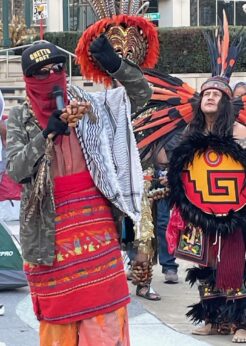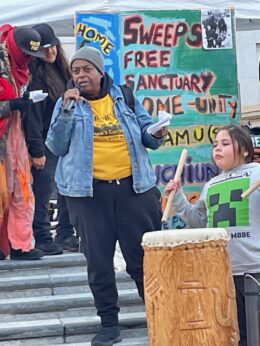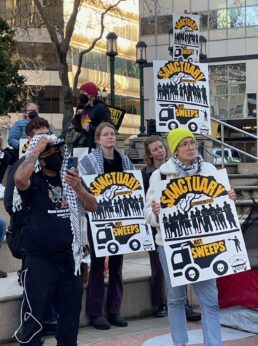
OAKLAND, Calif.—As City Councilmembers prepared to start their final meeting of 2024, protesters gathered outside City Hall on the afternoon of Dec. 17, erecting tents and a speaker’s platform in the plaza and demanding that sweeps to remove homeless encampments be ended and unhoused people be provided with permanent, deeply-affordable housing and needed services. They also denounced potential cuts to affordable housing in light of the city’s major budget deficit.
Similar protests were launched the same day in other West Coast cities, including Los Angeles, Fresno, San Francisco, Vallejo, and Seattle, in response to the avalanche of sweeps removing unhoused encampments across the country after the U.S. Supreme Court in June announced its decision in Grant’s Pass v. Johnson. That decision enabled cities to sweep encampments even when no housing was available for those displaced. The court’s vote was 6 to 3, with the three justices Trump appointed during his first term part of the majority, and Justices Sotomayor, Kagan, and Jackson dissenting.
Following the Grant’s Pass decision, California Gov. Gavin Newsom called on cities to end encampments, and cities including San Francisco and Oakland acted in accord. In Oakland, now-recalled Mayor Sheng Thao waited until October before directing the city to plan and conduct encampment enclosures in “emergency” situations even when no other housing was available for those displaced.

Oakland’s Dec. 17 protest was planned by POOR Magazine and the Wood Street Commons, an internally-organized community of unhoused people who in April 2023 were swept by the City of Oakland from the encampment homes they had built. The California Poor People’s Campaign was among the participating organizations.
The action began with prayers and observations from Indigenous and African communities. “Today, when we come together from all walks of life, we witness the horrible things that happened on this land because of colonization,” Corrina Gould, chair of the Confederated Villages of Lisjan, told the protesters. “Today, we are saying ‘No More!’”
Declared Lisa “Tiny” Gray-Garcia, co-founder of POOR magazine: “You cannot talk about homelessness without talking about Indigenous and Black land theft. We all are and should be housed in this occupied land. This is the work we have to do now … we’re going to get tighter and stronger and march farther and faster!”
Genie Sullivan, with Woods Street Commons and the Poor People’s Campaign, recalled their family’s experiences with repeated evictions. “We must have our demands heard … It’s time to rewrite the narrative, it’s time to build a society where resources are shared, where everyone has a chance to thrive, and where we prioritize people over profits. We have the power to make that change; we must continue to organize because we will only ever get what we are organized to take.”

Nell Myhand, quad chair of the California Poor People’s Campaign, told the crowd, “The crisis comes down to a policy choice, with federal and state level governments protecting big corporations and the wealthy from paying their fair share of taxes while prioritizing military spending.” Myhand urged that poverty and homelessness not be criminalized and called for an immediate end to encampment sweeps, with funding redirected to upgrading encampments and building “sweeps-free sanctuary communities.”
John Janasko, houseless resident leader at Wood Street Commons, described the city’s response to homelessness saying, “All the government ‘solutions’ like cabin communities and shelters have failed to create the necessary foundation unhoused people need to be able to rebuild our lives.”
Meanwhile, many participants entered City Hall to present their concerns during the council meeting’s public comment period.
Housing advocate Needa Bee told councilmembers, “The traumatization and brutality we are seeing Oakland’s unhoused residents experience is unbearable and unprecedented.” She said that rather than ending homelessness, the city’s practices are “driving people deeper into homelessness and helplessness,” and called for eviction funding to be redirected to “life-sustaining services” and provision of “permanent, deeply-affordable housing.”
Ronnie Boyd, community organizer with East Bay Housing Organizations, added, “Time and time again, our unhoused neighbors have spoken about the trauma of sweeps; yet the city continues to do them. Everyone deserves to live a life of dignity and respect. Sweeps do not allow that to happen, and thus, should be discontinued.”
Asked Kimberly King, a professor at Laney College: “Are homeless people just supposed to disappear, or die, as many do before their time? Unaffordable housing, homelessness, and housing insecurity … are the result of policy decisions that increase homelessness.” King thanked Councilmembers Carroll Fife and Nikki Fortunato Bas “for their commitment to housing as a human right.”

Beyond an end to sweeps, organizers have put forward solutions which include the use of vacant properties for housing, a permanent moratorium on rental evictions, and defunding of coercive “CARE courts,” a behavioral health intervention in which officers may involuntarily confine individuals suspected of dealing with mental illness issues.
LeMonte Ford of Wood Street Commons wrapped it all up in a few words: “We need land, we need it now! Public land for public good!”
Protest participants had planned to stay in the “sanctuary community” of tents in front of City Hall for several nights. But hours later, after the city administrator told them to leave, they relocated to the parking lot of an abandoned Greyhound station a half-mile away.
Meanwhile, police had forced a similar community at San Francisco’s City Hall to disperse.
Krista Chan contributed to this story.










